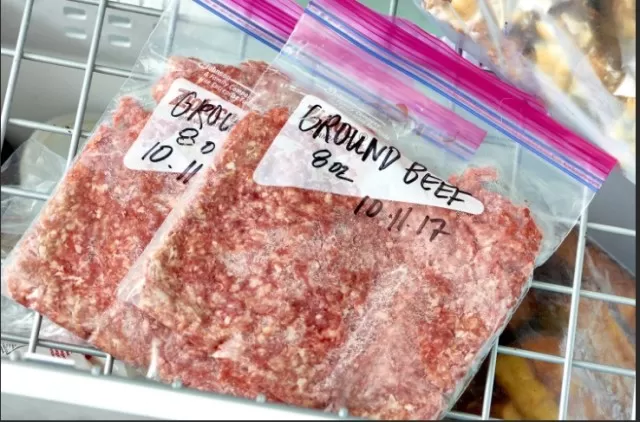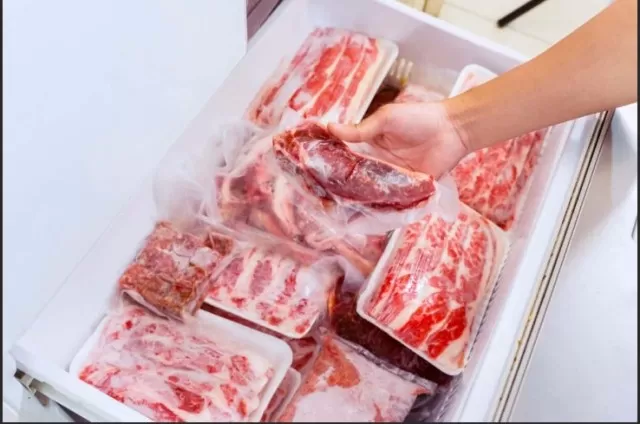Recall Alert: Ground Beef Recalled for E. Coli Concerns. The recall was initiated by the United States Department of Agriculture (USDA) in conjunction with American Foods Group, trading as Green Bay Dressed Beef. The reason behind the recall, as stated by the USDA, is the potential contamination of ground beef with E. coli bacteria. This issue came to light when the Food Safety and Inspection Services (FSIS) received notice that a sample, collected by a state public health partner, tested positive for the presence of E. coli. This prompted the immediate recall to ensure consumer safety and public health.
When Defrosting Ground Beef: Avoid Thawing on the Counter

It’s important to handle food safety with care, and this holds especially true when defrosting ground beef.
While a recent recall has brought attention to contaminated products, it’s crucial to know that the recall only affects a specific supply of ground beef. These tainted products were distributed to specific areas in Georgia, Michigan, and Ohio.
The recall pertains to 80-pound cases of ground beef that contain 10-pound plastic tubes.
To identify these products, look for the establishment number “EST. 18076” inside the USDA mark of inspection.
The affected lot code for this recall is “90050 BEEF FINE GROUND 81/19” with lot code D123226026.
Although no illnesses have been reported thus far, the USDA recommends that distributors and customers who have purchased these products should either discard them or return them to the place of purchase.
This precaution is essential to ensure that contaminated products do not reach consumers, and to safeguard public health.
Clarification on Ground Beef Recall

Although the recall involves a substantial quantity of ground beef, the contaminated products have only been distributed to Georgia, Michigan, and Ohio.
Specifically, the recall pertains to 80-pound cases of ground beef that consist of 10-pound plastic tubes. These products can be identified by the establishment number “EST.
18076” found inside the USDA mark of inspection. They are further distinguished by the following lot code:.- “20473 BEEF HALAL FINE GROUND 73/27” with lot code D123226027.
Consumers in these affected regions are advised to check their ground beef purchases and take appropriate action as per the recall instructions to ensure food safety.
3 Ways to Safely Defrost Ground Beef—and Why You Should Avoid Thawing on the Counter

When it comes to handling ground beef, safety is paramount.
It’s essential to defrost it correctly to minimize the risk of foodborne illnesses. Here are three safe ways to defrost ground beef:.
Refrigerator Method: This is the safest and most recommended way to defrost ground beef.
Place the sealed package on a plate or tray in your refrigerator. Ground beef will thaw slowly in the refrigerator, typically taking around 24 hours for each pound.
This method keeps the meat at a safe temperature and reduces the risk of bacterial growth.
Cold Water Method: If you need to defrost ground beef more quickly, submerge it in a sealed, leak-proof plastic bag in cold water.
Change the water every 30 minutes to ensure it remains cold. This method takes approximately 1-2 hours per pound of meat to thaw.
Cook the beef immediately after thawing with this method.
Microwave Method: Use your microwave’s defrost setting to thaw ground beef.
However, this method is not recommended for large quantities of meat. If you choose this method, it’s crucial to cook the ground beef immediately after thawing, as some parts may start cooking during the defrosting process.
Now, as for why you should never thaw ground beef on the counter, it’s because doing so can lead to unsafe temperature levels that encourage bacterial growth.
Bacteria can multiply rapidly at room temperature, posing a risk of foodborne illness. It’s important to prioritize food safety and use one of the recommended methods for thawing ground beef to ensure it’s safe to consume.
As a side note, you mentioned a recall affecting ground beef products that were shipped to distributors in Georgia, Michigan, and Ohio.
While there have been no reports of illness associated with these products, it’s essential for consumers to stay informed about recalls and follow the guidance provided by authorities, like the USDA, to ensure their safety. Discarding or returning affected products is a responsible and safe course of action.
*The information is for reference only.